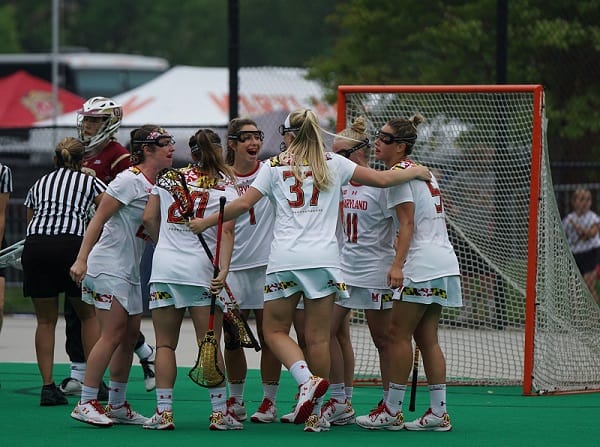“If you can see it, you can be it.” In a nutshell, that’s why promoting women’s sports in the media matters. It empowers girls and women of all ages. Even if they’re not planning to exactly emulate, say, swimmer Penny Oleksiak – a four-time Olympic gold medalist – visible role models encourage everyone to go after what they want.
Worldwide, this is a pivotal moment for women’s sports. From 2018’s hype around the first U.S. women’s Olympic hockey gold medal in 20 years, to the build-up to the 2019 FIFA Women’s World Cup in France, the profile of women’s sports has never been higher.
However, much work lies ahead. Forty-one per cent of Canadian girls aged 3 to 17 aren’t active in sports. With the onset of adolescence, female sports participation drops by more than 20 per cent. This is due in part to what we call the confidence gap. Many women struggle to pursue opportunities with the same confidence as men, because they’re socialized by being rewarded for being good, instead of for being energetic, rambunctious, or even pushy. As a result, many girls learn to avoid taking risks and making mistakes. This is to their detriment, as many psychologists now believe that risk-taking, failure, and perseverance are essential to confidence-building.
This drop in confidence is coupled with the fact that women’s sports coverage in Canadian media isn’t as prevalent as it should be. In fact, it tops out at around five per cent of the overall total.
Sports leadership also benefits from female representation. From coaches and referees to league presidents and lead broadcasters, having women in authority positions yields better facilities, funding, and acceptance for women in sports – and in society at large.
Approaching it from a sports journalist’s perspective, I can attest that I likely never would have gotten hooked on women’s hockey without the power of media representation.
As a kid, I idolized NHLers like Guy Lafleur and Pavel Bure. I watched the first International Ice Hockey Federation (IIHF) Women’s World Championship final in Ottawa on TV in 1990 when Canada won gold in the famous pink jerseys. But I’d never seen a women’s hockey game in person.
Then I attended the taping of a CBC Television talk show in Vancouver, promoting the 1998 NHL All-Star Game. Under everyone’s seats were free tickets to the Canada-U.S. women’s exhibition game at GM Place (now Rogers Arena) before the Nagano Olympics.
I still remember the exhilarated, record-setting crowd of 15,000 for women’s hockey that night. I thought: “I’m a journalist. This is a story I have to tell.”
In 2002, I covered my first Olympic women’s hockey tournament for the IIHF, and I’ve never looked back.
Here are three ways you can help raise the profile of amazing women athletes so we can all see the field grow:
Make your fandom known
Women’s sports are growing in popularity all the time, and people need to know who the athletes are. It doesn’t cost anything except time and creativity to use Twitter, Facebook, or Instagram to talk about a great game, an amazing athlete, or a record-setting play. Engage with other fans, and don’t be afraid to tag the big players like TSN and ESPN. Do you have a blog? Write a post about what you admire about your favourite female athlete. The more people who are contributing to the public conversation about women’s sports, the more resources big networks will commit to coverage.
Support women sports journalists
While you’re cheering for your favourite midfielder, don’t forget to give a shout-out to the people adding to her profile and helping to raise her career to the next level. Post about the exciting things happening in women’s sports, from roster announcements and major anniversaries to dramatic team rivalries and pop culture moments, and tag women sportswriters and broadcasters like Kristina Rutherford and Tessa Bonhomme. Share their work, and show your support to get the team some attention.
Mentor a budding athlete
Get involved with organizations who think outside the box and are invested in mentoring the next generation of MVPs and life-long sports participants. Founded in 2018, SheIS cross-promotes the Canadian Women’s Hockey League (CWHL), the Women’s National Basketball Association (WNBA), and other leagues, encouraging fans to share their positive experiences at women’s sports events on social media. ViaSport, British Columbia’s provincial sports agency, staged a “Level the Field” event in Vancouver on International Women’s Day, designed to elevate sport through gender inclusion. The Canadian Women’s Foundation funds programs like Girls Got Game, which reduces barriers for newcomer and refugee girls to playing sports. By giving them access to different physical activities, the program strengthens their personal and social skills, and helps them reap the important long-term benefits of exercise and play.
When women’s sports are seen, the audience grows, athletes’ salaries rise, and so does the confidence of girls who want to pursue their passion. If you share your love of the game, support your fellow fans, and volunteer with female athletes, we’ll see the field grow to accommodate all players.
Learn More:
- From the Slopes to the Spotlight: How Olympic Gold Medalist Dara Howell Uses Failure As Fuel
- Confidence is a Key Goal for Girls Got Game
- Tips to Keep Girls Playing #LikeAGirl
- Confidence Doesn’t Always Come Naturally – Even When You’re an Olympic Athlete
Take Action:
- Sign up for our e-newsletter to have our latest stories and resources sent to your inbox.
- Follow us on Facebook and Twitter to join a national conversation about gender equality.






